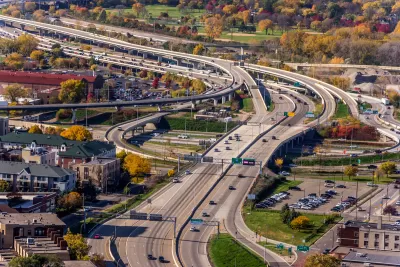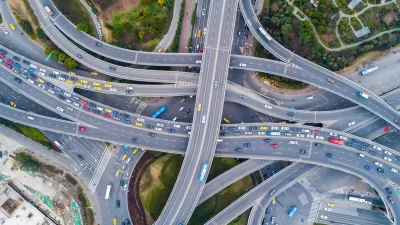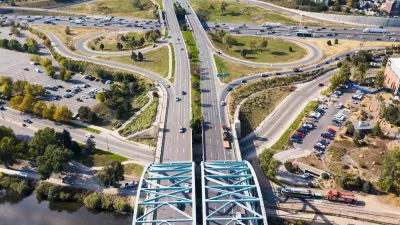The state’s department of transportation will have to consider potential greenhouse gas emissions and alter projects that don’t meet emissions reduction targets.

A 2023 Minnesota state law aimed at reducing greenhouse gas emissions “sets its sights squarely on transportation” by directing the Minnesota Department of Transportation (MnDOT) to consider climate impacts and demand for vehicle miles traveled in proposed highway and road expansion projects.
As Janet Moore explains in The Star Tribune, “If those calculations do not meet MnDOT's targets, the scope of the project must be altered ‘until it conforms,’ or it could be dropped, according a state working group that studied the new law.” A project can also include mitigating measures such as public transit, bike and pedestrian paths, environmental restoration, and roundabouts.
According to Jon Solberg, MnDOT's assistant division director for sustainability, “it's not unlike dealing with wetland mitigation, or crafting ways to comply with existing state and federal environmental laws when planning a new project. It will also encourage agencies, regional planning bodies and local governments to work together more to ensure the targets are met.”
The policy, which goes into effect next February, is part of a broader plan to reach net zero carbon emissions in the state by 2050. According to MnDOT, the agency is focusing on maintaining its existing road system and not planning major expansions.

Alabama: Trump Terminates Settlements for Black Communities Harmed By Raw Sewage
Trump deemed the landmark civil rights agreement “illegal DEI and environmental justice policy.”

Planetizen Federal Action Tracker
A weekly monitor of how Trump’s orders and actions are impacting planners and planning in America.

How Atlanta Built 7,000 Housing Units in 3 Years
The city’s comprehensive, neighborhood-focused housing strategy focuses on identifying properties and land that can be repurposed for housing and encouraging development in underserved neighborhoods.

In Both Crashes and Crime, Public Transportation is Far Safer than Driving
Contrary to popular assumptions, public transportation has far lower crash and crime rates than automobile travel. For safer communities, improve and encourage transit travel.

Report: Zoning Reforms Should Complement Nashville’s Ambitious Transit Plan
Without reform, restrictive zoning codes will limit the impact of the city’s planned transit expansion and could exclude some of the residents who depend on transit the most.

Judge Orders Release of Frozen IRA, IIJA Funding
The decision is a victory for environmental groups who charged that freezing funds for critical infrastructure and disaster response programs caused “real and irreparable harm” to communities.
Urban Design for Planners 1: Software Tools
This six-course series explores essential urban design concepts using open source software and equips planners with the tools they need to participate fully in the urban design process.
Planning for Universal Design
Learn the tools for implementing Universal Design in planning regulations.
Jessamine County Fiscal Court
Caltrans
Institute for Housing and Urban Development Studies (IHS)
City of Grandview
Harvard GSD Executive Education
Toledo-Lucas County Plan Commissions
Salt Lake City
NYU Wagner Graduate School of Public Service





























